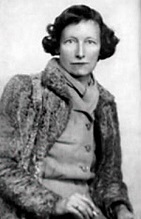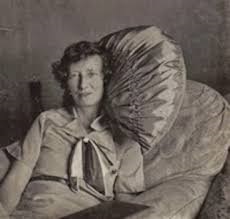Life
| 1898-1984; b. 10 Sept. [err. 1901]; Dublin dg. of Margaret O’Shaughnessy who eloped at 21 with a Protestant English architect named Powis Hoult; her mother died when she was nine, her father months after; with 2 brothers, ed. at various schools in England and stayed with her father’s relations; returned Ireland, 1931-37, and experienced shock at narrow-mindedness of her maternal relatives; worked in newspapers, first with Sheffield Daily, afterwards with Telegraph, Pearson’s Magazine, and Evening Post; issued Poor Women! (1928), short stories, which incls. “Violet Ryder”, later published as a novelette (1930); became full time writer on its success; issued Time, Gentlemen, Time! (1930), a study of alcoholism and marriage; spent two years in America to 1937-39, returning to London; corresponded with Oliver St. John Gogarty; issued Holy Ireland (1935) and Coming from the Fair (1937), both dealing with Ireland in a critical vein; |
| also wrote Sister Mavis (1963), dealing with the experience of an Irish girl who leaves Dublin to work in a care home in a poor district of London; other novels incl. House under Mars (1946), Girls in the Big Smoke (1977), and Only Fools and Horses Work (q.d.), a cheerful study of widowhood; contrib. to Irish Writing, ed., David Marcus, during 1952; her Frozen Ground (1954) is autobiographical; moved back to Ireland, 1957; briefly married to Oliver Stonor [prop. Frederick Field Stoner], an English novelist, and was friends with Fred Urquhart, a correspondence with whom survives in his papers; she was living in Jonquil Cottage, Greystones in 1979 and died there, 6 April 1984; her Farewell Happy Fields (1948) was reprinted in 2019 with an introduction by Louise Kennedy; Poor Women! was issued by Kathleen P. Costello-Sullivan in a critical edition (Anthem 2019). NCBE DIW DIL IF/2 KUN OCIL |
|
||||
[ top ]
Works| Novels |
|
| Short stories |
|
| Anthologies |
|
[ top ]
Criticism| Contemp. notices |
|
| Recent notices |
|
|
[ top ]
Commentary
Ulick O’Connor, ‘Joyce and Gogarty’ (1990): ‘when Norah Hoult, wishing to place Gogarty as a character in one of her novels, gave him smoke-blue eyes, because, she said, Joyce was always right about such things, Gogarty replied indignantly that this was not so.’ (Augustine Martin, ed., James Joyce: The Artist and the Labyrinth, London: Ryan Publ. 1990, p.347; also cited in Robert Deming, ed., James Joyce: The Critical Heritage, London: Routledge & Kegan Paul, 1970, [Vol. 1] p.282 and presum. sourced in O’Connor’s early biography of Gogarty, The Times I’ve Seen: Oliver St John Gogarty, 1963.)
Sinéad Gleeson, Introduction to Cocktail Bar ([1950]; 2018 rep. edn.]), in The Irish Times (28 March 2018): ‘Eleanor Norah Hoult was born on September 10th, 1898, in Dollymount, on Dublin’s north side into a mixed marriage. Her Catholic mother Margaret O’Shaughnessy and Protestant father Powis Hoult had defied their families and eloped. When Norah was nine her mother died, followed quickly some months later by her father. / She and her brother were sent to England, pinballing between relatives and boarding schools. After school, she found work with various newspapers and magazines, and wrote many book reviews over the course of her life, notably for the New Statesmen. This proximity to words and books may have been formative in the move towards her own writing, and her first book, Poor Women!, a collection of stories, was published in 1928. [...] The peripatetic nature of her life added to the sense of Hoult as an outsider; of one rooted in both Irish and English traditions, and this key element contributes to the pervading tone of Cocktail Bar. Written while in England, Hoult’s vantage point allowed her to see Ireland from another angle. Like Joyce’s precision about Dublin while in exile, Hoult was free to dissect Ireland’s morality, its view of women, and the rural and urban lives at the mercy of the church’s hierarchical control. [...] Hoult’s hyphenated identity makes her a little tricky to place in the canon, particularly when her world is not that of the Big House or the farmhouse kitchen, but I don’t think that is why she has been left out. Ultimately, she was a victim of snobbery about what is perceived to be popular fiction by women writers. Editing two all-female anthologies has shown me how easy it is for writers to be forgotten, particularly if they are women. This is exacerbated if they do not cleave to one nationality, one location, or one set of circumstances. What is clear, from the sheer volume and breadth of her work, is how much Norah Hoult had to say and how unafraid she was of articulating things that many others didn’t dare to. I hope this collection will send people searching for her sizeable catalogue of writing, and will garner Hoult the recognition she deserves.’ (The article gives an account of the different story-collections; see full version in RICORSO Library > Criticism - as attached.)
Kathleen P Costello-Sullivan, Introduction to Poor Women!: Critical Edition (Anthem 2019): Irish author Eleanor Norah Hoult (1898-1984) moved in prominent literary circles and corresponded actively with some of the leading Irish authors of her time, including James Stephens, Brigid Brophy, Sean O’Casey, and Sean O’Faolain. Oliver St John Gogarty sent poems and sketches to Hoult; he bemoaned that it was ‘a damned shame that the most realistic woman writer living only can get a £100 in advance subject to their damned Federal Tax’. Sean O’Faolain wrote in 1936 to congratulate Hoult on her novel Holy Ireland, observing that he ‘admire[d] the strength of it [...] and the sympathy of it’. Critics today are often equally positive: they compare her not only to short story writers O’Faolain and Frank O’Connor, but also to novelists Kate O’Brien and Edna O’Brien for the insight of her work into the lives of women and the influence of the Catholic Church. / Despite her reputation and a 44-year publishing career, Hoult’s oeuvre remains surprisingly neglected. She is generally recognized as a significant twentieth-century Irish author - yet reference to Hoult and to her work is often limited to indexes, biographical dictionaries and anthologies. The need for a sustained critical and academic engagement with Hoult’s canon remains. / This edition seeks to rectify that critical oversight by introducing Hoult’s short story collection Poor Women! to a new generation of readers. Called Hoult’s ‘best-known and most widely admired work’, Poor Women! was nonetheless rejected 19 times before its acceptance and publication in 1928 by Scholartis Press in London. Yet its release was marked by almost immediate critical acclaim: the 1929 American edition featured an ‘Open Letter’ from H. M. Tomlinson, who noted that ‘there is no doubt, if she continues to write, that she is likely to be freely named whenever the best fiction is discussed’. Poor Women! displays Hoult’s subtlety and humour as an author and her nature as a keen witness to human frailty - perhaps the combination of ‘strength’ and ‘sympathy’ to which O’Faolain would refer. Hoult sketches her characters in all their flawed humanity, thus creating individuals ‘whose thoughts and language inspire both the reader’s sympathy and a sharp awareness of their limitations’. This remains one of the most commented-upon aspects of her writing. (Available at Cambridge UP - online; accessed 11.12.2020.)
[ top ]
Quotations
Holy Ireland (1935): “I was talking about the iniquitous war,” said Lalor. “Tell me, Miss O’Neill, you are pro-Boer, are you?” / “I don’t know. I suppose I am. All the same, I admire the English.” / “Quite right,” said Langdale. “I admire the English for the way they have of enjoying themselves.” / “Thatís not the point,” said Lalor. “In this war there’s a right side and a wrong and the English are dead wrong.” / “There’s two sides to everything,” said Langdale. “Indeed I often thing that there’s at least three.” / “That’s what the Jesuits taught you at Clongowes, Tommy. God help you. God help the poor young man, for he’ll be moidered the rest of his mortal life. Now the Christian Brothers taught Charlie here and myself that there’s right and wrong. Or wrong and right, whichever way you like to put it. Isn’t that so, Charlie?”’
‘Caviare to the General’, review of Beckett’s More Pricks than Kicks, in the Dublin Magazine, 9.3 (July-Sept 1934): ‘a holiday for highbrows’; further describes Belacqua as a hybrid of Bloom and Stephen Dedalus, and the author as ‘a clever young man’ who ‘knows his Ulysses as a Scotch Presbyterian knows his Bible.’ (pp.84-87; quoted in John Harrington, The Irish Beckett, p.65.)
[ top ]
References
Desmond Clarke, Ireland in Fiction [Pt. II] (Dublin: Royal Carbery 1985), bio-notes: b. Dublin 1901, ed. England; both parents [Anglo-Irish] died; lived ed. boarding school, worked in London; staff of several newspapers incl. Sheffield Daily, Telegraph, Pearson’s Magazine, and Evening Post; prolific fiction author; Irish books include Poor Women (1930) [five stories, an ageing prostitute, a bullied servant girl, a spinster living off charity, &c.; see Baker]; Holy Ireland [err. Landale for Langdale]; Coming from the Fair [follows on from death of Patrick, his fortune squandered by Charlie, 1903-16]; Selected Stories [stories reprinted from Poor Women under variant titles]; Farewell Happy Fields [Adam Palmer defies God in revenge for his detention in provincial Irish mental asylum]; Cocktail Bar [12 stories on defeat and incompatibility, opening with wedding of Irish London couple]; A Death Occurred [in London luxury flats]; Frozen Ground [autobiographical, Irish orphaned girl to teens, relatives in Yorkshire, boarding school, ineligible young man’s real love falls on barren ground]; Father Hone and the Television Set [priest buys communal telly, and events leading to its disposal]; Father and Daughter [11 years of Shakespearean actors’ life, husband, wife hankering for musical hall, contrasting daughters, small town Ireland]; Husband and Wife [Monty Mallory again]; Sister Mavis (1963) [Irish girl leaves Dublin to work in care home in poor district of London]; Frozen Ground (1954) is autobiographical.
Stanley Kunitz, ed., Twentieth Century Authors (1967 ed.), describes herself as an ‘anti-feminist’ in the belief that feminism has done much damage; refers two novels to an Irish setting.
Robert Hogan, ed., Dictionary of Irish Literature (Dublin: Gill & Macmillan 1979), bio-notes: b. of Anglo-Irish parents in Dublin who died early [err.]; ed. England, returned 1931-1937; 1939, USA; lives in Greystones; Poor Women! (London: Scholartis 1928, and reps.), stories, including ‘Bridget Kiernan’, a young domestic in pre-war Britain, also a story ‘Violet Ryder’, printed separately as a novelette (Heinemann 1930 [limited edn.]).
Belfast Public Library holds Holy Ireland (1935); also Violet Rider [sic] (1930). There is a 1984 rep. of Holy Ireland, with a preface by Hoult and an introduction by Janet Madden-Simpson. In the preface, Hoult speaks of her shock at the bigotry of her mother’s family on visiting from school in England shortly after her parents’ deaths.
University of Ulster Library holds Holy Ireland (London: Heinemann; NY: Reynal and Hitchcock 1936), [6,] 369, [1]pp.; House under Mars (London: Heinemann 1946); Only Fools and Horses Work (London: Hutchinson 1969), 224pp; A Poet’s Pilgrimage (London: Hutchinson 1966); Violet Ryder (London: Elkin Matthews & Marrot 1930, lim. edn. 800); Youth Must be Served (London: Heinemann 1933).
[ top ]

